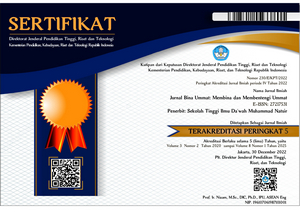THE CHARACTER CONCEPT OF COURAGE (AS-SYAJA'AH) AND ITS IMPLEMENTATION IN ISLAMIC EDUCATION
DOI:
https://doi.org/10.38214/jurnalbinaummatstidnatsir.v5i2.148Keywords:
Character, Courage, EducationAbstract
The study of human character is a very important study in the global era, because almost all psychologists and modern education and human resource research recognize that positive character development really helps every organism or individual achieve success and improve the quality of human resources. Therefore, the purpose of this study is to prove that the types of characters in the Qur'an are superior characters and have been tested by history which have given birth to the great success of Muslims in the past. This study also aims to explore the noble and superior characters in the Qur'an in improving human resources. Among these characters is the character of courage (As-Syaja'ah). The method used in this study is a non-interactive qualitative method that focuses on literature studies (library research) integrated with historical studies (Historical Research) accompanied by the experiences of certain communities and in certain periods with analysis, re-interpretation and description according to context. and contemporary life. The results of this study are; know the types of positive and constructive character in Islamic education, namely courage and analysis of its implementation in the learning process in modern education. The benefit for educators, educational institutions and parents is to provide broad and superior insights and competencies for them in education.
Published
Issue
Section
This work is licensed under a Lisensi Creative Commons Atribusi 4.0 Internasional.
Authors who publish with this journal agree to the following terms:
- Authors retain copyright and grant the journal right of first publication with the work simultaneously licensed under a�Creative Commons Attribution License that allows others to share the work with an acknowledgment of the work's authorship and initial publication in this journal.
- Authors are able to enter into separate, additional contractual arrangements for the non-exclusive distribution of the journal's published version of the work (e.g., post it to an institutional repository or publish it in a book), with an acknowledgment of its initial publication in this journal.
- Authors are permitted and encouraged to post their work online (e.g., in institutional repositories or on their website) prior to and during the submission process, as it can lead to productive exchanges, as well as earlier and greater citation of published work (See�The Effect of Open Access).




